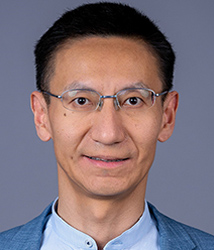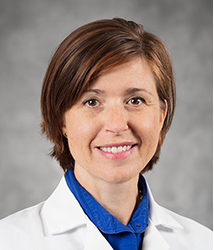Center for OB/GYN Research Innovation is Leading the Way to Improve Women’s Health
Published Date
Story by:
Media contact:
Share This:
Article Content
Women’s health care is not only vital for the health of individual women but also the health of families and communities in general. The University of California San Diego School of Medicine Department of Obstetrics, Gynecology and Reproductive Sciences (OB/GYN) recently hosted an inaugural Women’s Health Symposium, in conjunction with its Center for OB/GYN Research Innovation (CORI).
Marianna Alperin, M.D., OB/GYN professor and co-chair for the inaugural women’s health symposium, emphasized the significance of the symposium’s main goal, “The symposium brought together researchers, clinicians and leaders from across UC San Diego to promote innovation through team science for advancement of women’s health research and, ultimately, clinical care.”
At the symposium, Cynthia Gyamfi-Bannerman, M.D., chair of the Department of Obstetrics, Gynecology and Reproductive Sciences, stressed the importance of coming together and sharing information, noting that there are major gaps in research focused on women’s health; currently 20 percent of the National Institutes of Health budget is allocated for women’s health, while women make up 51 percent of the U.S. population.
The symposium drew more than 160 clinicians, scientists, trainees, industry partners and community members. Irene Su, M.D., OB/GYN professor, co-director of CORI and co-chair for the symposium, highlighted a project on ovarian tissue transplantation to improve long-term women’s health that brought together basic, translational, and population scientists, clinicians and patients across UC San Diego as an example of the team science being facilitated by CORI. Other speakers included Brian Aguado, Ph.D., assistant professor in the Shu Chien-Gene Lay Department of Bioengineering and co-director of the Women’s Health Innovations through Scientific Discoveries, Engineering and Medicine (WHISDEM); Barbara Jung, M.D., associate vice chancellor and dean of the School of Medicine; and John Carethers, M.D., vice chancellor for Health Sciences.
To highlight the breadth of women’s health research in obstetrics, gynecology and reproductive sciences and across campus, 22 speakers from 12 departments delivered presentations and flash talks on discovery science, translational and clinical research, technology and engineering. Physician leaders framed each session with clinical challenges in maternal and infant health, reproductive health, and aging and menopause. Fostering collaboration was a central theme of all talks as speakers highlighted their research and clinical resources and how to reach out to work together.
“This was an amazing start to teaming up for women’s health,” said Su. “Speakers and attendees from across campus, from engineering to biomedical science to public health, from pediatrics to psychiatry to pathology, as well as our San Diego community coalesced because we know that together, our efforts will be stronger.”
Key highlights from the symposium

Marni Jacobs, Ph.D., assist adjunct professor of OB/GYN, shared about the Multi-Omics for Health and Disease (MOHD) Consortium and the Mom-Health (Multi-Omics for Maternal Health) Study. “The consortium aims to use multi-omics to detect and assess profiles associated with healthy and disease states from a wide variety of conditions, including hypertensive disorders of pregnancy (HDP), to asthma, diabetes, kidney, and liver diseases, from study sites across the U.S. Specific to the focus of CORI, 70 percent of maternal deaths due to HDP occur in the year after delivery,” said Jacobs. “HDP are further associated with poor health outcomes later in life, highlighting the importance of this disorder to health across the lifespan. Through CORI and collaborative events like the Women’s Health Symposium, we aim to use multi-omics to uncover mechanisms to improve maternal and infant health outcomes during pregnancy, the postpartum period, and beyond.”
Sheng Zhong, Ph.D., professor in the Shu Chien-Gene Lay Department of Bioengineering, and director of the Center for Artificial Intelligence in Biomedicine, presented a new method called SILVER-seq, a non-invasive method of analyzing extracellular RNA from IVF embryo culture media. “Using this technique, we created an atlas of human embryo development (TETA), revealing RNA makers linked to embryo quality and development. Coupled with AI, this method could potentially improve IVF outcomes, possibly making treatments safer and more effective,” said Zhong.
Recent studies have shown that women are more likely than men to develop Alzheimer’s Disease. The Women: Inflammation and Tau Study (WITS) is working to understand why, and what we might do to reduce the risk.


“Many more women than expected in our study, close to 70 percent, were found to have sleep apnea,” said Sarah Banks, Ph.D., associate adjunct professor in the Department of Neurosciences and director of neuropsychology at the Center for Brain Health and Memory Disorders. “Half of those cases were moderate or severe. Yet these women were unaware. Sleep apnea has close ties with cognitive decline and is fully treatable. Through our WITS research on sleep and other modifiable risk factors for dementia, along with genetic and other factors that differ by sex and with hormones such as estrogens, we are on a mission to find potential new targets to reduce or prevent dementia in women.”
More information on these topics and videos of the presentations can be found on UCSD TV.
Share This:
You May Also Like
ALERTCalifornia Awarded 2025 Special Achievement in Geographic Information Systems (GIS) by Esri
Science & EnvironmentStay in the Know
Keep up with all the latest from UC San Diego. Subscribe to the newsletter today.




